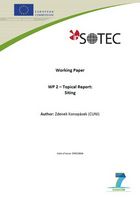
KONOPÁSEK, Z. (2014): Siting case studies. Topical report - working paper of the InSOTEC project (WP 2). Available at http://www.insotec.eu/publications/topicalreports
::::The InSOTEC case studies related to siting repositories of high-level radioactive waste do not and cannot come up with simple solutions or recipes. Rather, they suggest, more or less directly, that a slightly more reflective way of addressing sociotechnical tensions and complexities would be beneficial. During the controversies described, quite often one party claimed that a certain problem was ‘purely technical’ or ‘purely social’. However, just as often it was possible to successfully doubt such a claim and take it as a sign of a suspicious and unconvincing strategy of the opponent, because the issues were all so obviously entwined. The contribution of these case studies might consist in offering us an enhanced understanding of what occurs on the borderline between the ‘social’ and the ‘technical’. To talk about the sociotechnical challenges of deep geological disposal of nuclear waste would then mean to reflect on sociotechnical complexities – their highly specific, situated and, in a way, irreducible nature – but also, at the same time, preserve a sensitivity towards and understanding of the fact that these complexities are made manageable in practice by means of various simplifications and purifications. This is a difficult (seemingly contradictory) point with subtle political consequences, to which the cases presented hopefully provide at least some empirical background.
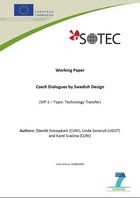
KONOPÁSEK, Z. / SONERYD, L. & SVAČINA, K. (2014): Czech Dialogues by Swedish Design. Working paper of the InSOTEC project (WP 2). Available at http://www.insotec.eu/publications/topical-reports
::::Transferring an elaborate design to a different setting is always an intricate business with uncertain results. This report takes this well-known lesson as a starting point for a study of the travel of a ready-made design for public dialogue on geological disposal. We want to discuss how established participative procedures are made to travel from one national context to another under the auspices of the EU and what the limits and consequences of such transfers are. The interesting thing for us is not only how the target setting is changed or not by the newly introduced practices, but also how the relatively well established participatory “technology” is itself being transformed during its transmission and implementation. Successes and failures of such a transfer have to be seen and assessed against the background of these mutual accommodations, translations and betrayals. Thus, our general interest is the fragility and ambiguous results of intentional and systematic spread of technical democracy across national and political contexts. More precisely, we will follow and critically discuss the story of how a Swedish design for public dialogues called RISCOM was transferred to the Czech Republic. We are going to show that, on the one hand, RISCOM made an important achievement in the Czech case, since it helped to bring all the main actors to a discussion table after previous negotiations had completely crashed. On the other hand, however, it seems that RISCOM substantially failed from a broader perspective. It found its way in the Czech Republic only at the cost of losing its specific original characteristics (and emphasizing new ones, rather controversial). As such, it quickly became associated with only too general appeals to dialogue, the attractiveness of which lived but shortly. It contributed to the increasing focus on dialogue per se, which ultimately led to frustration and impatience on both sides. This recently resulted in the shift toward more authoritative decision making in the Czech Republic and another crisis of mutual trust.
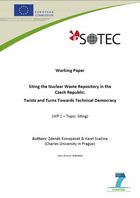
KONOPÁSEK, Z. & SVAČINA, K. (2014): Siting the Nuclear Waste Repository in the Czech Republic: Twists and Turns Towards Technical Democracy. Working paper of the InSOTEC project (WP 2). Available at http://www.insotec.eu/publications/topical-reports
::::We are going to present a story of a double turn: first, the turn toward deliberative procedures orchestrated by the implementer; this turn came after the initial period of expert driven decision making had led to public protests and failed. Second, we describe a turn back toward more authoritative and technocratic decision making after several-years long attempt at “technical democracy”, to use this famous term (Callon, Lascoumes & Barthe 2009), did not bring expected results quickly enough. While the former kind of turn appears relatively frequently in literature, often accompanied by an account of how subsequent deliberation brought about interesting results, the latter does not seem to be discussed too often – although similar failures may not be so rare. This could be related, among others, to the fact, that while the first kind of events documents the need to take “social aspects” of technology into account (and, eventually, an important role of social learning), telling about failing attempts at carefully orchestrated public dialogue (under the auspices of EU projects) complicates the point – which is what we would deliberately like to do in this case study; and by doing so we hope to join the discussion about the limits of participation and about how to “move beyond mere sloganizing over science and democracy”. We want to show that a misunderstanding about the meaning of the notion of “socio-technical” can be seen behind the described double turn. Socio-technical, at least as far as its STS origin implies, does not mean simply just adding a list of “social issues” to the technical agenda. Not in a way in which the two sets of aspects are kept apart, separated and hierarchically ordered as two different kinds of issues to be solved in different spaces and times. And not in a way which is simply based on gathering experts and lay people together so that they may speak to each other and therefore constitute a kind of “socio-technical” discourse. Instead (and in accordance to the work done within STS), the notion of socio-technical refers to analytical determination to approach and understand social and technical processes together, as a single network, i.e., going hand in hand, inseparably (i.e., Callon 1991; Latour 1991 and elsewhere). Something like this, of course, is hard to translate into policy practices and formalized public involvement – which is valid even more for policy cultures that have remained practically untouched by “the emerging interest in scientific citizenship today and multiple new forms of public participation in science and technology” and in which scientific expertise still very much enjoys the status of politically neutral authority, external to societal life. In a way, we are convinced that the siting process in the Czech Republic has fallen victim to the simplified understanding of what “socio-technical” means for technical democracy in the making.
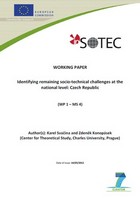
SVAČINA, K. & KONOPÁSEK, Z. (2012): Identifying remaining socio-technical challenges at the national level: Czech Republic. Working paper of the InSOTEC project (WP 1 – MS 4). Available at http://www.insotec.eu/publications/file-cabinet
::::This report describes the history, recent developments and the current situation of the management of highly radioactive waste and spent nuclear fuel in the Czech Republic, with a particular focus on the development of geological disposal for this kind of waste. Special attention is given to the interplay of social and technical aspects of the process. The first chapter gives an overview of the state of affairs and sketches out the trajectories leading to it. The institutional background, legislative framework and relevant government policies, as well as the role of affected communities and other civil society stakeholders are considered. The second chapter tries to identify the main socio-political challenges that the process of geological disposal development is currently facing. By socio-political challenges we mean problems and obstacles that complicate the negotiations between the implementer and other relevant groups, be it other state institutions, municipalities, or NGOs. The third chapter takes these observations a step further, and tries to identify significant socio-technical challenges within this process. By looking at the problems as socio-technical, we want to emphasize and highlight the fact that there is interplay of social and technical aspects, and that it is often problematic or counterproductive to consider them as separate, purely social and purely technical aspects. The ultimate goal of identifying significant socio-technical challenges then is to sketch out problems of interest for case study research in the second work package of InSOTEC.
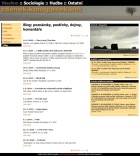
KONOPÁSEK, Z. (2010): Co znamená "sociální konstrukce"? Blog Zdeňka Konopáska, 3. 11. 2010. Dostupné na adrese http://zdenek.konopasek.net/index.php?m=151&i=1490&b=151
::::Dnes mám v rámci oslav 20-letého výročí oslav Centra pro teoretická studia, stejně jako další kolegové, krátce promluvit na libovolné téma ze svého oboru. Rozhodl jsem se v této mini-přednášce shrnout několik vysvětlení k pojmu, který dnes dělá tak často sociologii ostudu, a přitom by nemusel. Tady je ta řeč písemně.
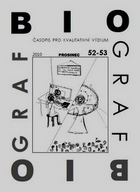
KONOPÁSEK, Z. (2010): V čem spočívá pravda náboženské skutečnosti? Sociologický pohled na mariánská zjevení a démonické posedlosti. Biograf (52-53): 89-101
::::V tomto textu shrnuji východiska a závěry tříletého výzkumného projektu "Jak se dělá náboženská skutečnost: Zjevení a posedlost démony jako praktický a kolektivní výkon" (GAČR 403/08/1758). Opírám se při tom o dosud napsané články, většinou spolu s Janem Palečkem. Stručně: Spojujícím momentem různých našich analýz je mnohotvárnost a praktická různorodost toho, čemu říkáme náboženská víra. Inspirovali jsme se přístupy z oboru současných vědních studií a pokoušíme se o jakousi neredukcionistickou sociologii náboženství. Zvolili jsme za předmět studia podivné, nevšední a v mnoha ohledech sporné situace (zjevení, posedlost), které rozdělují nejen věřící a nevěřící, ale i mnohé věřící navzájem, a které nám umožňují zachytit i tak dlouhodobě a dokonale sedimentovanou skutečnost, jakou je skutečnost náboženská, v pohybu a rozpolcení.

KONOPÁSEK, Z. (2009): Co by nás prý na vědě nemělo šokovat...? Blog Zdeňka Konopáska, 21. 11. 2009. Dostupné na adrese http://zdenek.konopasek.net/index.php?m=151&i=1215&b=151
::::Na okraj jednoho rodícího se "vědeckého skandálu": věda o klimatu přistižená v nedbalkách.
KONOPÁSEK, Z. (2008): Expertíza a politika životního prostředí: Případ projektu Natura 2000. CTS Research Reports, CTS-08-02. Praha: CTS. Dostupné na adrese http://www.cts.cuni.cz
::::As sociologists interested in the relationships between expert knowledge and policy making we have studied in detail the processes of implementation of European directives on natural habitats, wild fauna and flora (92/43/EEC) nad on conservation of wild birds (79/409/EEC) in the Czech republic - i.e., the preparation and implemenation of so called Natura 2000. We have focused on diverse practices of expert mapping of the Czech nature, on how national lists of Sites of Community Importance were produced and on how the preparation of these lists was consulted with the public. We also observed how Natura 2000 was shaped by various actors in various ways, so that it could be connected to various plans, projects and trajectories (beyond the plan of Natura 2000 itself). As a result, a number of compromises were incorporated into the project - compromises which were often regarded as problematic, but which, at the same time, made Natura 2000 an object that could be reasonably shared (and supported) by environmentalists, naturalists, policy makers, activists and scientists from various fields. In comparison to, e.g., France, the implementation of Natura 2000 in the Czech Republic passed through smoothly, without major political controversies and as originally intended, i.e., as an exclusively expert driven project. To explain this we offer some insights into different political cultures in the Czech Republic and Western Europe, including specific contexts of the Czech accession process to the EU and its impact on political culture. Our close study of how the Czech nature was mapped and how so called national lists were established reveals that these processes were not completely apolitical and purely expert-driven. We have described a number of particular interests, political calculations, EU-related concerns, organisational contexts etc. intervening into the seemingly purely scientific methods and viewpoints. However, we have also shown that these non-scientific elements often did not work against the scientific quality of the project, but rather reinforced it. For instance, some administrative interventions strengthened the quality of scientific data - as their unintended by-product. Thus, we now better and more realistically understand what it means when we say that a project is purely expert-driven. It means usually something slightly different than to proceed strictly apolitically, but on the other hand it does not mean that expert perspectives are made secondary or even irrelevant.
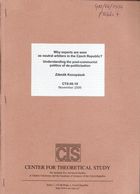
KONOPÁSEK, Z. (2006): Why experts are seen as neutral arbiters in the Czech Republic? Understanding the post-communist politics of de-politicization CTS Research Reports, CTS-06-06. Praha: CTS. Dostupné na adrese http://www.cts.cuni.cz
::::The situation in contemporary Czech Republic provides numerous examples showing that experts and scientists keep enjoying an unchallenged and privileged status of neutral arbiters, situated out of the political arena. Although comparisons between the post-communist East and (capitalist) West are always at risk of being schematic and inadequate, it seems that such de-politicized perception of science is much stronger in the Eastern Europe than in most Western European countries. Underdevelopment of STS (Science and technology studies) in the post-communist East is part of this diagnosis. Different political cultures of expertise in the “new” and “old” EU member states might even turn into sources of tension and misunderstanding on the level of particular problems and controversies. In my paper I would like to make the difference and its roots more understandable. I will discuss the political status of science under the communist regime and its implications for the development after 1989. That time, in the Czech Republic, science and expertise were to be “finally liberated” from the burden of the political, with the hope that this de-politicization would bring us closer to Western democracies. This was a huge misapprehension, however, since Western democracies were at the very same time shifting towards a kind of “re-politicization” of the realm of science and technology. Propensity toward de-politicization was further increased, again quite paradoxically, by the process of accession of the Czech Republic to the EU. This process, simply put, had the form of purely technical implementation of unquestionable measures and principles. Although my presentation will take empirical evidence and case examples mostly from the Czech Republic, it may open a more general discussion about science and expertise in other post-communist countries as well.
Paper prepared for the international workshop on Science and Democracy. A New Frontier between Eastern and Western Europe? The Nobel Museum and Södertörn University College, Stockholm, September 4-6 2006
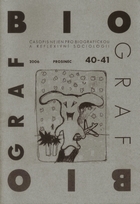
KONOPÁSEK, Z. / PALEčEK, J. (2006): V moci ďábla: Exorcismus věřícnýma očima. Biograf  (40-41): 138-171
(40-41): 138-171
::::Kritický rozbor filmu V moci ďábla (Scott Derrickson 2005). Ukazujeme, jak tvůrci rozehrávají nejednoznačnosti ohledně medicínského/náboženského vysvětlování tragického případu exorcismu. To nám umožňuje vysvětlit některé podstatné prvky našeho vlastního přístupu při výzkumu duchovních a religiozních zážitků v psychiatrii.
KONOPÁSEK, Z. (2005): Exploring ordinary resources of an extraordinary power: Toward ethnomethodological study of the communist regime CTS Research Reports, CTS-05-07. Praha: CTS. Dostupné na adrese http://www.cts.cuni.cz
::::Příspěvek připravený jako zvaná plenární přednáška na konferenci Mezinárodního institutu pro etnometodologii a konverzační analýzu (IIEMCA), Bentley College, Waltham, MA, USA, 6.-9. srpna 2005
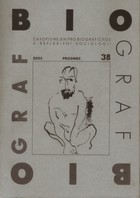
KONOPÁSEK, Z. (2005): Nesnáze s etnometodologií. Biograf , (38): 85-109
, (38): 85-109
::::
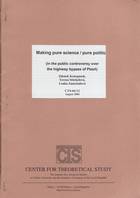
KONOPÁSEK, Z. / STÖCKELOVÁ, T. / ZAMYKALOVÁ, L. (2004): Making pure science / pure politics in the public controversy over the highway bypass of Plzeň CTS. Research Reports, CTS-04-12. Praha: CTS. Dostupné na adrese http://www.cts.cuni.cz/
::::Paper prepared for the Joint 4S & EASST Conference 2004 Public proofs – science, technology and democracy, Paris, Ecole des Mines, August 25-28 2004
This paper is based on a detailed empirical case study of a long-term public controversy over the construction of a highway bypass around the city of Plzen (in South-Western Bohemia, Czech Republic). The controversy involved a wide range of actors: local activists, an environmentalist NGO, politicians of all levels, experts, developers, state and regional administration, and media people. Two variants of the bypass were at stake: one of them gradually appearing better and better, attractive for experts, but existing as if only on paper, while the other was becoming more and more real, pushed through mainly by local politicians, and actually constructed. Although the story could be narrated in terms of an unequal struggle between environmentalists and small villages on one side and politicians, economic lobbies and municipality of a big city on the other, we will try to follow a more subtle and complex story-line, which focuses upon different strategic usages of science and politics. Besides explaining how it happened that one of the variants “attracted” the winning properties (and “won”), we will also describe a “vicious” circle of a double purification of science and politics and show how it contributes to the fragility of both democracy and expertise.
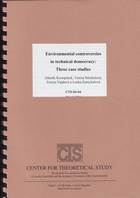
KONOPÁSEK, Z. / STÖCKELOVÁ, T. / VAJDOVÁ, T. / ZAMYKALOVÁ, L. (2004): Environmental controversies in technical democracy: Three case studies. CTS Research Reports, CTS-04-04. Praha: CTS. Dostupné na adrese http://www.cts.cuni.cz/
::::In this research report we present a collection of three case studies that have been undertaken within our work on the research project "Analysing public accountability procedures in contemporary European contexts". The overall aim of the project was to study opportunities and limits of democracy in societies in which expert knowledge becomes crucial for almost any decision-making and socio-technical networks that shape our daily lives are being openly and widely contested in the public arena. Especially in cases where science and technology are involved and where technicalities of different sorts and specialised knowledge penetrate political agenda, i.e., on the borderline of science and politics, the principles of open, friendly, inclusive and transparent politics (as well as the classical principles of disinterested and independent expertise) get into troubles. That is why we decided, in our research, to confront the principle of public accountability with the flesh-and-blood reality of the following socio-technical controversies, elaborated as in-depth case studies: (1) The controversy over the building and operation of the household waste incinerator in Praha-Malesice; (2) The public conflicts concerning the highway by-pass around the city of Plzeň; (3) Current policies and controversies related to the introduction of GMO into the Czech legal, social, economic and political environment.
KONOPÁSEK, Z. / KUSÁ, Z. / STOCKELOVÁ, T. / VAJDOVÁ, Z. / ZAMYKALOVÁ (2002): Czech Republic - a national profile. Research report of the Public Accountability European Research Project, CT2001-00076. Praha. Dostupné na adrese http://zdenek.konopasek.net/docs/WP1_Czech.pdf
:::: 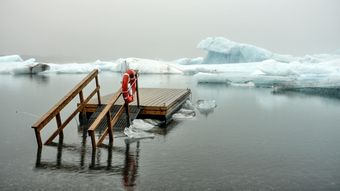
 ? - recenze vyjde v časopise Biograf
? - recenze vyjde v časopise Biograf
 se objevily informace o tom, co lze snad prý během března čekat v nové, sedmé verzi mého oblíbeného analytického programu
se objevily informace o tom, co lze snad prý během března čekat v nové, sedmé verzi mého oblíbeného analytického programu










